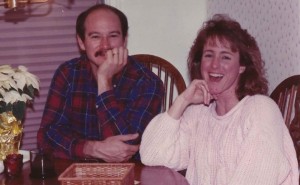Here’s a question: What was going on in your life 19 years ago, in early February 1995?
As you know, if you’ve read my book, A Normal Life, or the first chapter after signing up here on my website, it was this week 19 years ago that my family’s world was turned inside out and shaken up badly. This week, 19 years ago, my sister, Molly, and her husband, Walt, became victims of carbon monoxide poisoning. Walt died in the accident. Molly barely survived and sustained a severe brain injury. Everyone in my family helped Molly during her rehab and has helped her in many ways over the years, but my mother has been and still is Molly’s primary caregiver and greatest supporter.
With this 19th anniversary in mind and because many people are now reading Molly’s story, I wanted to provide an update on Molly and Mom since I finished writing the book more than a year ago. Much has changed since the last chapter; in fact, new chapters of this odyssey through brain injury are occurring each week.
These changes over the past year were challenging on their own, but also impacted each other in the ways that difficulties in life often do.
- Molly has declined some, especially cognitively;
- My mother’s longtime companion, Glen moved out of my mother’s house and they are no longer partners; and
- Mom has had increasing caregiving needs for Molly due to her decline, and after 19 years of truly heroic work as Molly’s primary caregiver, she’s experiencing some caregiver burnout.
Update on Molly
Even though there are still days of improvement, overall Molly has declined in the past year, particularly with her cognitive functions. A decline was predicted by her doctors and is typical for people with brain injuries. However, Molly did not decline as soon nor as much as her doctors thought she might at this point. In fact, she continues to amaze her doctors with her high functionality, especially given the severity of her brain injury.
But these days, Molly is more forgetful. She struggles to find a word she knows and wants to use and can forget what she’s doing in the midst of doing it. This is frustrating for her and she becomes angry quickly. She can be grouchy and sharp-tongued and might throw to the ground whatever is in her hand, maybe her jacket, a book, her cell phone, or the TV remote.
Molly is also no longer driving. She was still physically capable of driving, but not safely because she would forget where she was going or how to get there in the midst of driving down the road.
At home, Molly also needs to be prompted for some activities of daily living, such as taking her medications, preparing a meal, dressing appropriately for an activity or the weather, and planning her time to maintain her schedule of appointments. Happily, once Molly is prompted, she usually does most of these tasks well, even though she can be grumpy at times about being coached into exercising or eating healthfully, or asked to hurry up or wear a coat.
However, without any prompting at all, Molly dotes on her two cats and is always on time with their feeding. She gives them excellent care and spends hours playing with them. Molly still adores her cats.
Molly had a hip replacement this past August so she no longer has pain when she walks. With physical therapy and plenty of reminders to stand up straight, she is walking better, especially when she uses her trekking poles.
Molly looks wonderful and she’s almost always charming and cheerful at social events or with others in a group, even with family. She enjoys Rotary meetings, going to the hair salon, and seeing movies or theater performances. She also enjoys reading and reads the newspaper every day and cat magazines that arrive each month, and she’s well into the latest Stephen King novel (544 pages!) Molly is also still devoted to Starbucks and goes every day for a coffee or cider. She loves to socialize at Starbucks with the baristas, other regulars, and customers new to her, too. She still has a crackling good sense of humor, and can be lively and fun when she’s in a good mood.
Update on Mom
Glen and his family decided he would no longer live with Mom and he now lives with one of his daughters. Mom had asked Glen to get the medical care that his doctors were recommending, but he didn’t want to take their advice and his daughters agreed that the care was unnecessary. Glen was also beginning to have some dementia. Mom was very sad to see him go, but knew that she couldn’t insist on what she thought was best for him.
His departure was hard on Mom. She loved Glen and enjoyed being with him. He was helpful to her and provided an important balance in her life. With the demands of caregiving for Molly increasing, and Glen no longer present to provide companionship and comfort, the burden of caregiving and the toll it took on Mom became much heavier.
With Molly not driving and having greater caregiving needs, and Mom trying to do it all on her own, she soon felt overwhelmed. Mom took to heart the all-important first rule of caregiving—you must take care of yourself first before caring for others. Mom tracked down and hired excellent health professionals and caregivers to spend time with Molly through the daytime hours on most days of the week. Another wise and loving action from Mom, and it’s been a big improvement for everyone.
This vital action on Mom’s part gave her relief from caregiving constantly and some much needed time for herself and her own life. Molly also seems better as she works with her new caregivers. Molly considers Naomi, who spends most days with Molly, to be a close friend. Hiring some help has also improved Mom and Molly’s relationship, making their time together on Sundays and every evening for dinner much more pleasant. Mom is still Molly’s primary caregiver, but now she has supportive colleagues who work with her to help Molly. As a result, Mom can focus on her most important roles with Molly–being her mother and friend.
**************************************
You can share this post using the email and social media links below. Thanks! Also, please ask a question or leave a comment here on the blog. I’d really like to know your thoughts. We can learn from each other and keep the conversation going. Thank you.


Great update! I read the book and was curious as to how things were going now. I don’t know how your mom does it. So glad she got help.
Hey Susan, Thank you so much for your comment. Like you, many people were asking me about Molly and Mom and how things are going now. And you’re right–my mom is amazing. Thanks for being such a great friend to us all.
Just finished your book and was glad to find this post to see what has happened since. Your experience with your sister is very helpful for anyone trying to care for a loved one with dementia (my mother-in-law) or a traumatic brain injury (my brother-in-law). I’m not surprised to read that Molly is no longer driving, but wondered how you managed that. Getting her to give up the car keys could not have been easy. Also, how accepting has she been of the caregivers? Your hard-earned wisdom is most welcome.
Pamela ,
I have not been on Lyrysa’s blog too often, but I, the mother in this story, was the person who took on the job of getting Molly out of her car. First, I just asked her not to drive, but occasionally I found her going to the grocery store about a mile away. Gradually, she became irritated that the car was in her garage but she could not use it. One day, in anger, she said, “Get it out of here!”
I immediately called Molly’s youngest sister, Mary K. Their family always needed reliable transportation. She flew into Denver within days and drove the car to Omaha. Molly liked the idea that her car “Carvy” was still in the family. She especially liked the idea that her 18-year-old nephew was able to drive it. But she was angry with me for taking away her car and she never let me forget it–until she moved away from her home some 18 months later. At last she has stopped mentioning the car and seemingly holding it’s loss against me personally.
Dear Sally, I’m reading “A Normal Life” for the second time—thanks to you. I refer to the book often when I happen to be discussing the story with others, but I feel more attached and involved in the circumstances of the story this second time of reading. My heart aches for Molly and you as well. I wanted so very much to meet Molly and to hold her hand, to feel close to her—that would mean nothing to her, of course, but it would be an effort for me to absorb into myself some of her dreadful misfortune. I hope that makes sense. God love you,dear heart.